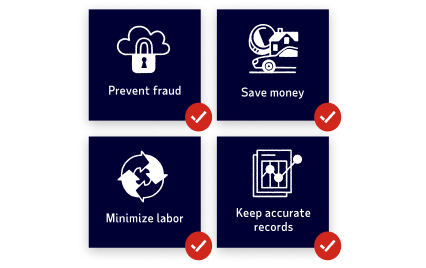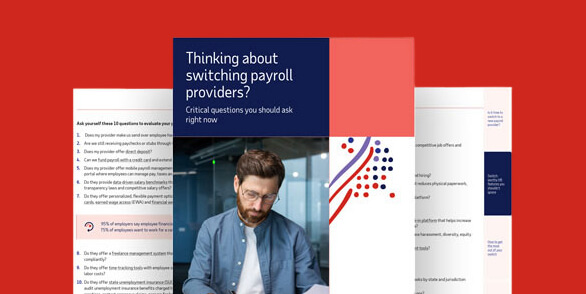insight
ACH payroll: What it is, how it works & its benefits
Looking for a faster, more secure method of paying employees?

Direct deposit is a cost-effective and secure way of paying employees. But what makes this modern convenience possible for payroll and banking? The electronic transfer system known as the Automated Clearing House (ACH) Network.
Table of Contents
What is the ACH Network?
The ACH Network allows companies, government agencies and individuals to electronically transfer money between bank accounts. Unlike other payment networks that can only do one or the other, it can push and pull funds. Same-day and future-dated transactions are both available.
Explore Learn more about ADP’s direct deposit software
What is an ACH payment?
There are many types of online payments possible through the ACH network, but those most relevant to employers managing payroll include the following deposits:
- Wages and salaries
- Travel and expense reimbursements
- Disbursements from retirement savings plans
- Dividend and interest payments
ACH transaction categories
ACH transactions fall into one of the following categories:
- ACH credits – Funds are pushed from the account of the transaction originator to the account of the receiver.
- ACH debits – Funds are pulled from the receiver’s account and sent to the originator’s account.
- Entries – Depending on the receiver’s account type, an ACH entry can either be a consumer payment or a non-consumer payment.
- Account validation – Validations verify that an account is open and accepting transactions.
- Prenotification – ACH entries with no monetary value may be issued before the first live entry to validate an account.
How to use the ACH payment method for payroll
In most states, employees must agree to direct deposit before an employer can begin using ACH payments for payroll. Employees must also provide their employers with the following information:
- Account type (checking or savings)
- Bank name
- Routing number (ABA/transit number)
- Bank account number
- Amount or percentage to be deposited each pay period
Employers give these details to their payroll service provider, who then processes the ACH payments on their behalf. ADP’s full-service payroll includes the setup and management of ACH payments.
The benefits of ACH payroll payment processing
Using ACH payments for payroll offers employers the following advantages:
- Direct deposit is usually cheaper than the cost of printing and mailing checks.
- Employees appreciate the speed and convenience of direct deposit.
- Electronic payment is more secure than paychecks, which can be lost or stolen.

Direct Deposit: fast, secure, and cost-effective
See how our payroll solutions make payday easy, fast, and secure for you and your team.
The drawbacks of ACH payroll payment processing
The benefits of using ACH payments when running payroll usually outweigh the cons, of which there are a few:
- Transactions can take one to three days to process, though same-day payments may be available.
- Some financial institutions prohibit international ACH payments, which may require wire transfers.
- There are daily cutoff times, which, if missed, can delay transactions.
- Banks may have a daily or monthly limit on how much money can be transferred.
The process of making ACH payments
ACH payments for payroll generally work as follows:
- After receiving authorization via a signed direct deposit form and all relevant banking information from the employee (receiver), the employer (originator) may initiate a transaction.
- The originating depository financial institution (ODFI) or bank receives payment instructions from the employer and sends ACH entries to the ACH operator.
- The ACH operator, a central clearing facility that performs settlement functions for financial institutions, forwards the ACH entries to the employee’s bank.
- The receiving depository financial institution (RDFI) or bank posts the ACH entries to the employee’s account or pay card.
- The employer’s account is debited, and the employee’s account is credited.
These steps are typically not necessary for businesses working with a payroll provider like ADP, which handles all ACH transactions on the employer's behalf

Unlock efficiencies for you and your team
Skip the paper checks and pay your team accurately and on time.
Frequently asked questions about ACH payroll
What is ACH direct deposit?
An ACH direct deposit is an electronic transfer that sends money directly into a bank account – for payroll, government benefits or tax refunds – over the Nacha-managed ACH network. To set it up, the payer needs the bank account and routing numbers of the payees. The payer’s bank subsequently initiates the payment, the ACH routes it to the payee’s bank and the funds are deposited.
How long does an ACH deposit take?
The speed of ACH payments can depend on the sender. For example, ACH payments can be processed within a few hours on the same business day. Alternatively, payments can be scheduled for the following day or up to two business days if the sender chooses.
Generally, employees who agree to direct deposit have access to their wages by 9:00 am on the scheduled payday. In some cases, the money may even be available before payday if the bank or credit union advances their own funds before settlement occurs. However, payments are not settled on weekends and federal holidays.
How much do ACH payments cost?
ACH payments are usually free. However, some banks may charge a nominal fee for certain types of transactions.
What's the difference between ACH payments, wire transfers and EFT payments?
ACH payments and wire transfers are two types of electronic fund transfers (EFT). ACH payments are limited to domestic transactions, are generally free and may take one to three business days to process. Wire transfers, in contrast, can be used for international transactions, albeit with fees, and are usually processed within the same business day.
Are there any penalty fees with ACH payments?
Overdrafting an account to make an ACH payment or exceeding the number of transactions permissible per month, if any, may result in penalty fees.
Are ACH transactions secure?
ACH transactions are secure due to stringent data protection requirements, such as encryption and tokenization. These safeguards are mandated by Nacha, the governing body of the ACH Network, to render account numbers unreadable when stored electronically.
The network's design includes multiple layers of security through verified entities and robust fraud prevention measures aimed at mitigating risks like credit-push fraud. Additionally, ACH transactions adhere to comprehensive regulatory standards and guidelines issued by bodies, like FFIEC and NIST, ensuring their continuous security and efficiency.
Ready to pay your people with ease and confidence?
When you choose ADP, you choose a superior payroll platform built for the way you work.
Next steps for switching to electronic pay
Transitioning to ACH payroll can make paying your team quick, secure and hassle-free. It can also simplify the payroll process, reduce errors and ensure timely payments. ADP’s payroll software, which offers electronic pay, can help you further streamline and automate payroll tasks, allowing you to keep your focus on running your business. For more details and to start your transition, visit ADP's payroll solutions.
Want more exclusive business insights like this delivered to your inbox?Subscribe now
1. ZipRecruiter is a registered trademark of ZipRecruiter, Inc.
2. Legal services are provided by Upnetic Legal Services, a third-party provider





